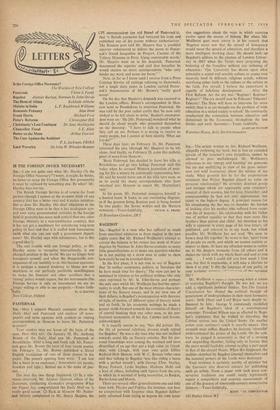BAGEHOT
SIR,—Bagehot is a man who has suffered as much from uncritical adulation as from neglect in the past eighty years. But Mr. Richard Wollheim's attempt to correct the balance in his review last week of Walter Bagehot by Norman St. John-Stevas contains so many false generalisations as to make one question whether he is not putting up a straw man in order to show how easily he can be knocked down.
In the first place, it is not true to say of Bagehot that 'In neither economics, politics, or literature did he have much time for theory.' The view can just be sustained in relation to his political writings (the only ones reprinted by Mr. St. John-Stevas and perhaps the only ones which Mr. Wollheim has had' the oppor- tunity to read). But one of the most obvious character- istics of his literary essays, and in my view one of their defects, is Bagehot's preoccupation with theories, of style, of motive, of different types of literary mind, and so forth. In his economic writings he made a greater stride forward towards the evolution of theory of central banking than any other man, as the pro- fessional economists of his day, Cairnes and Jevons, acknowledged.
It is equally untrue to say, 'Nor did private life, the life of personal relations, possess much appeal for. Bagehot.' He was a shy man who was not inclined towards social life or literary coteries. But his per- sonal friendships were among the wahnest and most divergified of an age that put a high value on friend- ship; with Clough, with your own great Editor Richard Holt Hutton, with W. C. Roscoe (who once said that talking to Bagehot 'was like riding a horse with a perfect mouth'), with George Eliot, Morley, Bryce, Fawcett, Leslie Stephen, Madame Mohl and a host of others, including such figures from the arts, to which he is accused of being insensitive, as Ruskin, Burne-Jones and Morris.
There are several other generalisations one can take issue with. Physics and Politics, for instance, can bear no comparison with Toynbee since Bagehot deliber- ately refrained from trying to impose his own tenta- tive suggestions about the ways in which societies evolve upon the course of history. But where Mr. Wollheim goes most astray is in his remark that `Bagehot never saw that the spread of democracy would mean the spread of education, and therefore a more intelligent working class.' He should look up Bagehot's address to the electors of London Univer- sity in 1867 when the Tories were proposing the 'Widening of the franchise without any widening of education : 'Our University has shown upon what principles a sound and sensible culture to young men sincerely bred in different religious creeds, without sacrificing either faith to the culture or the culture to the faith. For myself, I believe the experiment is capable of indefinite development. • . . After the First Reform Act the cry was "Register! Register! Register!" The cry should now be Educate! Educate! Educate! The State will have to intervene far more widely than is as yet thought ere the problem of wide education in a mixed society is solved.' lie continually emphasised the connection between education and democracy in the Economist, throughout the late Sixties and early Seventies.--Yours faithfully,


































 Previous page
Previous page